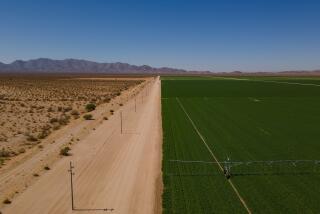Memories of Other Times of a Farm Depression
- Share via
The Carey Land Act, passed by Congress in 1894, turned over government land to arid states, with the proviso that irrigation projects bring water to the land.
The first summer we farmed our 40 acres of land, among the lava beds of Southern Idaho, there was not enough irrigation water to mature our first five acres of alfalfa. That was in 1918. We sold the cow, and Dad took us back to our former hometown in Washington State, where he worked in the railroad shops again, to get a new stake. All five of us had Spanish influenza at one time. Then the Armistice was signed on Nov. 11, 1918.
We went back to Idaho in the spring of 1919. In eight years there were seven years of drought. One summer water ran in the ditches only 15 days, and we had 350 days without water--no well, no electricity, no telephone, and no farm subsidies.
Early on, Dad had to borrow $1,700 from the land bank. He worked winters, just to pay the interest on his loan, and keep us eating. All around us farmers were going broke. Auction sales were frequent. Deficiency judgments were devastating farmers further, when they couldn’t make it, even with winter jobs hauling gravel to improve the dirt roads. After all their labors and hardships, the land bank considered their farms worth less then the original loan on raw land.
When it came our turn to be evicted, Dad hired a lawyer, and sold his 40 acres of land back to the land bank for $1, to avoid a deficiency judgment. He gave us his dream of a ranch, which had been promised a continuing flow of water “like a stream running constantly through the land.”
In 1926 we had our own auction sale. We left all behind but a few sticks of furniture (and memories). Dad was welcomed back to his old railroad machinist job, but the migraine headaches returned, the fallen arches, eased while walking on the land, once again became painful, while standing at vibrating machinery (before lathes and other machinery were bolted to cement floors.)
The only other problem was that he had to start his seniority all over again. In 1929, we came to Los Angeles one jump ahead of the Depression--and survived.
SYBLE LAGERQUIST
Los Angeles
More to Read
Sign up for Essential California
The most important California stories and recommendations in your inbox every morning.
You may occasionally receive promotional content from the Los Angeles Times.













